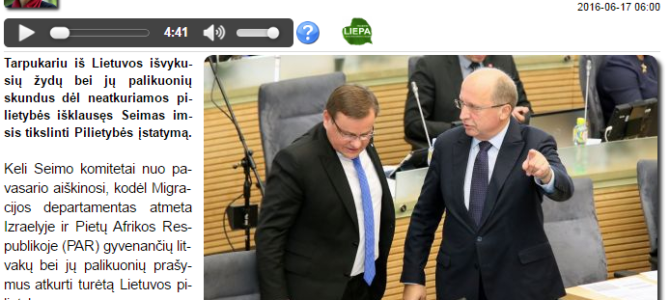By Raimonda Ramelienė
The Lithuanian parliament has heard complaints from Jews who left Lithuania between the wars and their descendants over their inability to restore Lithuanian citizenship and has begun amending Lithuania‘s law on citizenship.
Several parliamentary committees have been trying to determine since spring why the Migration Department has been rejecting requests by Litvaks and their descendants living in Israel and South Africa for restoration of Lithuanian citizenship.
Although members of parliament determined bureaucratic obstacles were hindering the process, they decided to put an end to conflicting legal opinions by amending the law. The initiator was oppoisition conservative leader Andrius Kubilius, aided by European Affairs Committee chairman social democrat Gediminas Kirkilas and deputy speaker of parliament Vydas Gedvilas. The draft legislation provides for a return to the practice in place between 2011 and 2015 where people who had citizenship before June 15, 1940 and left Lithuania before March 11, 1990—including their descendants– could restore citizenship without bureaucratic obstacles after presenting the required documents.
Causing a Problem
Although Kubilius is convinced this problem caused by our bureaucrats who had totally distorted the intent of the law on citizenship adopted in 2011 needs to be solved quickly. He says legislators had prescribed all Lithuanian expatriates who left before 1990 have the right to dual citizenship.
“This allows expatriates from Lithuania, Lithuanians and Jews, and their descendants, to preserve their Lithuanian citizenship. But our public servants began to demand strange personal evidence that Lithuania was left at that time because of danger. It’s forgotten that after the occupation of Lithuania on June 15, 1940, it was dangerous to return to Lithuania. Ignoring the will of legislators has caused problems in our relations with Litvaks today, tomorrow it will cause problems with expatriates of ethnic Lithuanian origin,” Kubilius said. He said the amendment was being proposed so public servants could have no doubt of the intention of lawmakers.
Public Servants Not at Fault
Lithuanian interior minister Tomas Žilinskas disagreed the process was halted by bureaucratic obstacles. “We’re just following the law in how it defines the concept of withdrawal,” the minister told Lietuvos Žinios. He pointed out no court had annulled a decision by any migration expert for refusing to restore citizenship for people in this category. “The court said we are interpreting the articles of law correctly and are making decisions with foundation,” the minister said. Žilinskas said he believed if there were uncertainties on how to interpret this or that part of the law, then the law needed to be amended so that “no double meanings or different understandings” would remain. “I really am in favor of citizenship being restored and granted to Litvaks. But for now, the law doesn’t allow it,” he said.
The law on citizenship provides nine situations in which a Lithuanian citizen may hold dual citizenship, among them: people who left Lithuania before March 11, 1990. MPs propose making this part of the law more precise by adding the phrase: “except for people who changed residence after June 15, 1940, in the territory of the former Soviet Union.”
Alternative Interpretation
Between 1918 and 1940 about one million citizens left Lithuania. The main direction was to North and South America, Australia and South Africa. Jewish citizens were a significant portion of those who left. One of their major destinations was South Africa. In 1990 there were about 100,000 Litvaks living there, with the number currently standing at 70,000-80,000. Many Jews who were Lithuanian citizens also now live in Israel, the USA and Australia.
Since April of 2011 when the new law on citizenship went into force, several thousand South African Jews have applied for Lithuanian citizenship. Many applications were satisfied and citizenship granted to about 1,000 South African Jews. In 2013 restoration of Lithuanian citizenship to this category of people became complicated by a new interpretation of the concept of “withdrawal.” In rejecting applications migration workers cited a finding by Lithuania’s Constitutional Court and case-law from the administrative courts to the effect that a person who withdrew from Lithuania before March 11, 1990 actually meant a former Lithuanian citizen who fled the country for political reasons, for opposing the [Soviet] occupational regime or because of persecution by that regime. Lithuanian officials say Jews did not experience persecution in the period between the wars.
According to information from Lithuania‘s Migration Department, ten Litvaks had their applications for restoration of Lithuanian citizenship rejected in 2014, 76 were rejected in 2015 and in the first quarter of this year 97 such applications were rejected.
Full story in Lithuanian here.


